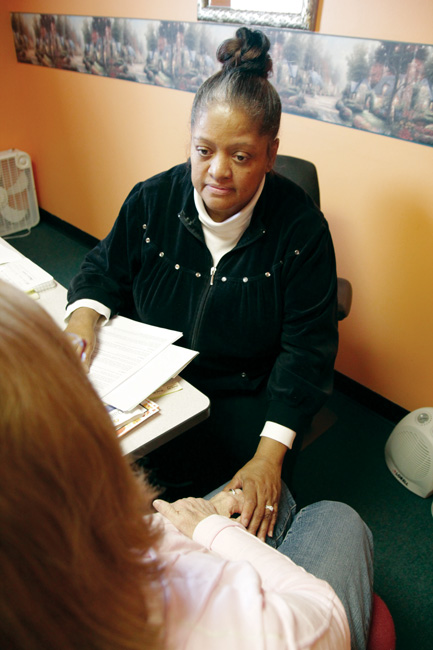When catastrophic events interrupt people’s lives that were just making it, everything changes. A chasm opens, and stretching a budget from week to week and month to month becomes impossible.
Some of the people who have lived through one catastrophe or another know they can turn to Catholic Urban Programs —CUP — in the Diocese of Belleville for help.
While CUP, one of two diocesan outreach agencies, primarily services Monroe, Randolph and St. Clair Counties, they also provide assistance in other areas of southern Illinois that are not served by Daystar Community Program, the other diocesan outreach agency which serves counties in the southernmost part of the state.
CUP staffers, like Venessa Marion, speak daily with people who have come to a place in their lives where they see nothing but trouble and need someone to listen to their stories and help them find hope.
Marion talked to a woman from Randolph County who had been referred to CUP when things went terribly wrong for her and her family.
They were “making it” when her husband, the primary breadwinner for his wife and six children, suffered a complicated break in his leg. He couldn’t work, and the family needed help to make it through this period in their lives.
The family was receiving food stamps, but “they got behind on their utilities,” Marion said, adding that CUP has adopted a policy of asking clients to pay 20 percent of bills to increase accountability for the funds they receive.
The family needed money to make a good-faith payment to the utility company, and then a federally funded agency would help with the rest that was owed.
“We gave them $75.00,” Marion said, “and they were so grateful.”
While it doesn’t seem like a great deal of money, without it they wouldn’t qualify for the other program.
Marion remembers another woman many years ago was helped with home repairs and utility bills.
Later, she recovered, and now “she comes in periodically and drops off money,” maybe not a lot but it’s what she can afford, Marion said.
Another man who also wanted to make a donation to CUP after he was helped, brought in $10-$20 a month, including the day he died.
“When people get back on their feet, they want to help the next person,” she said, “and the ‘thank yous’ and the appreciation makes this job worthwhile. We meet people at times when they may not be so lovely because they’re in desperate situations, but we have to meet them where they are.”
Executive director of CUP, Gerry Hasenstab, said the agency is trying to stretch its dollars further every month because Illinois has no budget.
The state owes Holy Angels Shelter and CUP thousands of dollars for various programs, but Hasenstab doesn’t know if a budget is ever approved whether the funds will be reinstated or reduced.
“We’re living on reserves at the Shelter,” he said.
Now, with budget constraints and other programs reducing assistance or closing down entirely, CUP is trying to meet more needs than ever before.
CUP works with other agencies, including the FBI that has called for help with crime victims.
Hasenstab said CUP also looks to the future when the agency might be able to “restart a volunteer program we once had for seniors. We were making home visits and checking in on folks.”
Yet funding is always a challenge, Hasenstab said.
Not dwelling on the negative, Hasenstab said, “while joy is sometimes hard to find, just knowing what we do, through all our departments and programs, we really do change lives.”
And families are not assisted in isolation. Because of the various programs within CUP, “we can help families in a number of ways: Children are enrolled in Griffin Center after-school and summer programs and emergency shelter is provided at Holy Angels. The Family Law Office might help in another way; if they need food, they come here,” he said, “and we can stabilize them so they can move forward.”
“How can a child study with no lights or no heat? he asked. “If we can stabilize their lives we’re not just putting a Band-Aid on it.”
CUP’s vision statement describes the agency in southern Illinois “where hope prevails, justice reigns and people are transformed.”
Catholic Urban Programs received $205,800 from the 2015 Catholic Service and Ministry Appeal. Please support the 2016 appeal, and give what you can.







